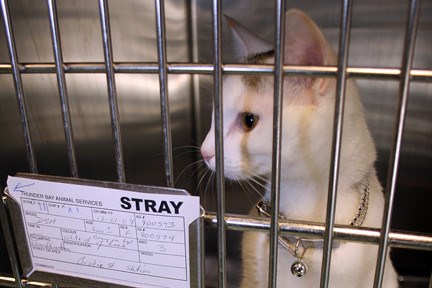Stray cats and dogs are one step closer to an automatic sterilization before the city’s animal services department will adopt them out to the general public.
After debating for more than an hour whether or not to double adoption fees to cover the cost of spaying and neutering pets in the pound in an effort to reduce the 1,200 animals put down by animal services, city council voted 6-5 in favour of the proposal.
But because it involves a $34,000 cost – and is projected to produce $25,000 in additional revenue – it won’t become law until it passes during budget deliberations next year.
The discussion was heated at times, mostly centred about concerns the added fees would lessen the likelihood animals would be adopted out.
At present it costs $110 to adopt a dog, $100 for a cat, which includes vaccination, a microchip implant and a $50 refundable spay-and-neuter rebate.
The proposed fee increases dog adoption to $220 and cats to $200. The Thunder Bay and District Humane Society charges $175 for cats and $225 for dogs, sterilization included.
Red River Coun. Brian McKinnon said it sounded a little too expensive for his tastes.
“I just don’t know if I would pay $220 for a neutered dog,” he said. “And I don’t know if the program would be successful because of that.”
Mayor Keith Hobbs was also unsuccessful trying to convince the rest of council to vote against the proposal, try as he might to play at their heartstrings.
“Does it not equate to having more cats to euthanize,” he said, upon learning the vast majority of animals put down last year – all but 30 –were felines.
Hobbs also said the added fees were discriminatory toward the city’s poor and seniors, who couldn’t afford them.
But Ron Bourret, manager of the city’s licensing and enforcement division, said too bad.
“You know what, maybe they can’t,” Bourret said.
Mark Smith, the city’s general manager of development services, said he doesn’t anticipate any impact on the adoption rate, pointing out the price isn’t a major sticking point with the pet-buying public, and it would cost them between $500 and $600 to get a pet acquired for free out of the newspaper neutered or spayed, a microchip implant and all its shots.
“It’s a cost they could never do themselves,” he said.
He later said the goal of the higher fees is to ultimately reduce the number of animals put down each year and the number of strays running around the city.
“Plus it’s largely held that an animal that is spayed is better behaved,” Smith said.
At-large Coun. Ken Boshcoff said it’s important the public understand the reasoning behind the decision.
“We’re not trying to do this to be mean-spirited in any way,” he said.
Bentz then expressed concern that if the program was too successful there might one day be a shortage of cats available in the city.
“We’re a long, long way from where there is a shortage of cats,” Smith said.
Meanwhile McKellar Coun. Paul Pugh suggested a one-year test might better serve the city, to which Smith said that city officials will revisit the program after a set period of time to gauge its success.
Included in the proposal are increased licence fees, including a $15 fee for animals that are sterilized and micro-chipped (currently free), upping the fee for non-sterilized pets from $35 to $50, $25 to $35 for pets that aren’t fixed but have a microchip, and $20 for sterilized pets.
The new fees are expected to net $19,000 in additional revenue for animal services, which has an annual budget of $700,000.
Sign in or register
- Messages
- Post a Listing
- Your Listings
- Your Profile
- Your Subscriptions
- Your Likes
- Your Business
- Support Local News
- Payment History
Registered Users
Already have an account?
New Users
Create a free account.
